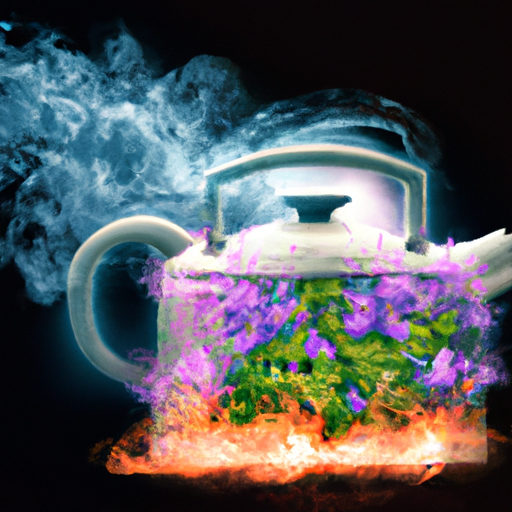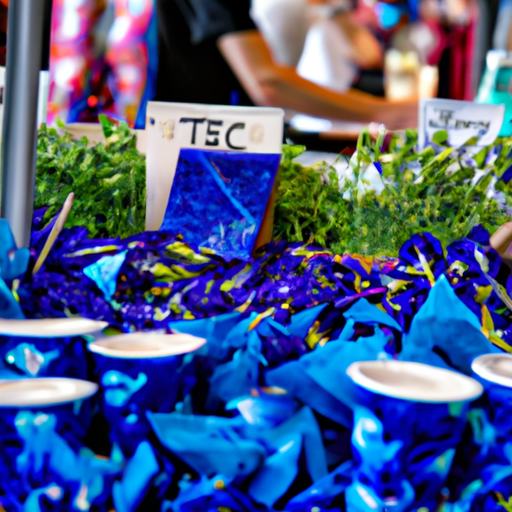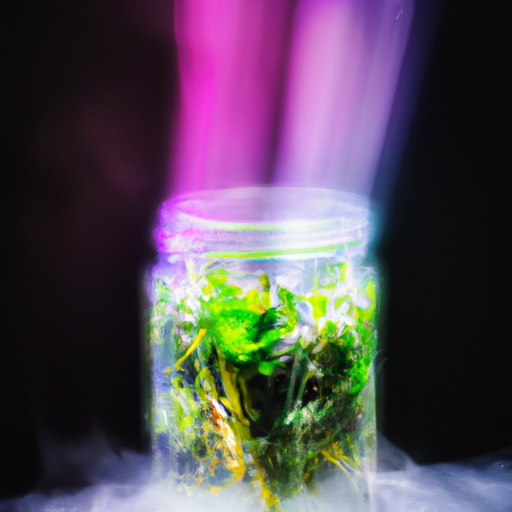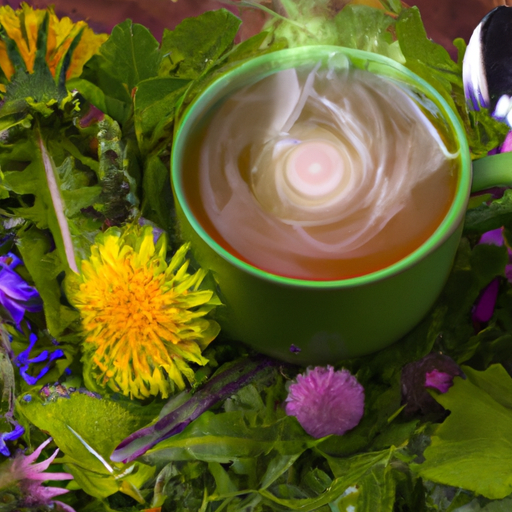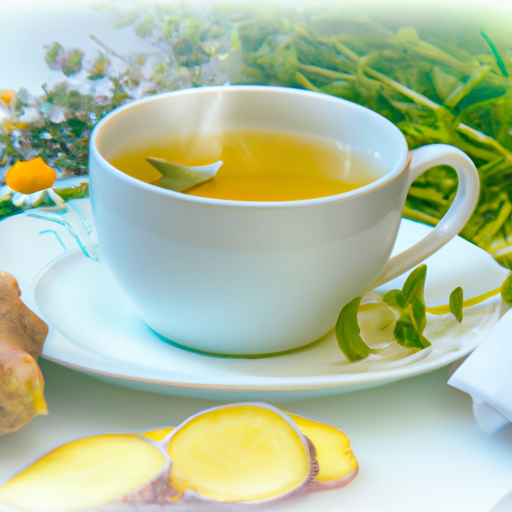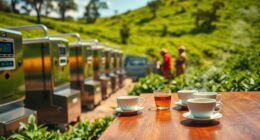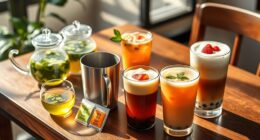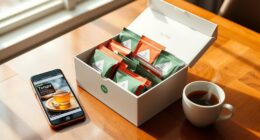Picture this: you’re sitting in your cozy kitchen on a chilly morning, savoring the aroma of a steaming cup of herbal tea. As the kettle whistles on the stove, you can’t help but wonder, how long does it take to boil herbal tea?
Well, my friend, the answer is not as simple as it seems. There are several factors that come into play, such as the type of herbal tea, water temperature, and the desired strength of the tea. Additionally, the size of the tea leaves or bags, altitude, and personal preference all play a role in determining the perfect steeping time.
In this article, I will delve into the intricacies of boiling herbal tea, providing you with insightful and detailed information. So, grab your favorite mug, and let’s embark on a journey to discover the perfect timing for that heavenly cup of herbal goodness.
Key Takeaways
- Herbal teas should be steeped in hot water for 5-10 minutes at a temperature of 205°F to 212°F.
- The optimal water temperature for flavor extraction is around 200 degrees Fahrenheit.
- Ceramic or glass teapots are recommended for better heat retention.
- Steeping time varies based on the type of herbal tea, ranging from 5-7 minutes for delicate teas to 7-10 minutes for stronger ones.
Types of Herbal Tea
Get ready to discover the incredible variety of herbal teas and let your taste buds be tantalized!
Herbal teas are not only delicious but also offer a wide range of health benefits. From chamomile to peppermint, each type of herbal tea has its unique properties that can soothe, relax, or invigorate your body and mind.
Some herbal teas, like ginger or echinacea, are known for their immune-boosting properties, while others, like lavender or passionflower, can help promote relaxation and better sleep.
When it comes to brewing methods, herbal teas are generally steeped in hot water for about 5-10 minutes. The water temperature should be around 205°F to 212°F to extract the maximum flavor and benefits.
Now, let’s dive into the next section and explore the importance of water temperature in brewing herbal tea.
Water Temperature
The optimal water temperature for brewing herbal tea is around 200 degrees Fahrenheit, giving it the perfect balance of flavors and aromas. The temperature of the water plays a crucial role in extracting the medicinal properties and delicate flavors from the herbs.
It is important to use high-quality water to ensure the purity of your brew. Tap water may contain impurities that can affect the taste of your tea, so using filtered or spring water is recommended. Additionally, the brewing vessel you choose can also impact the water temperature. A ceramic or glass teapot helps to retain heat better than a metal one.
Once the water reaches the desired temperature, it is ready to be poured over the herbal blend and steeped for the appropriate amount of time. This ensures that the flavors are properly infused into the tea, creating a delightful and soothing beverage.
Tea Steeping Time
Once you’ve achieved the optimal water temperature, you’ll want to steep your tea for the appropriate amount of time to extract the full range of flavors and beneficial properties. Tea steeping time can vary depending on the type of herbal tea you’re brewing and personal preference.
Here are three tea brewing techniques that can help you make the most out of your herbal tea:
-
For delicate herbal teas like chamomile or peppermint, steep them for about 5-7 minutes to bring out their subtle flavors.
-
Stronger herbal teas like ginger or hibiscus can be steeped for 7-10 minutes to extract their bold and robust flavors.
-
If you prefer a stronger brew, you can extend the steeping time by a few minutes, but be cautious as it may result in a more bitter taste.
Steeping your herbal tea for the right amount of time ensures that you get the maximum health benefits from the tea leaves.
Moving on to the next section about the size of tea leaves or bags…
Size of Tea Leaves or Bags
Steeping times can vary depending on the size of the tea leaves or bags. Larger leaves often require a longer infusion period to release their full flavor potential. When it comes to brewing time, it’s important to consider the size of the tea leaves or bags you’re using. Smaller leaves or bags generally steep faster, as the water can more easily interact with the surface area of the leaves.
On the other hand, larger leaves or bags may take longer to infuse. This is because the water needs more time to penetrate the inner layers and extract the flavors. It’s also worth noting that the infusion method can affect the brewing time. For example, using a tea infuser with larger holes may result in a quicker steeping process compared to a finer mesh.
Now, let’s explore how altitude can impact the brewing process.
Altitude
At higher altitudes, you’ll notice a remarkable difference in the way your tea brews, as the lower boiling point can result in a more delicate and nuanced flavor profile.
The reduced air pressure at higher altitudes causes water to boil at a lower temperature, usually around 200°F (93°C). This lower temperature can extract the flavors from the herbal tea leaves more gently, resulting in a smoother and less bitter taste.
Additionally, the lower boiling point allows for a shorter steeping time, which can preserve the delicate aroma and health benefits of the herbal tea.
The altitude can also affect the solubility of certain compounds in the tea leaves, influencing the overall flavor profile. For example, at higher altitudes, the extraction of caffeine may be reduced, resulting in a naturally decaffeinated cup of tea.
Considering the impact of altitude on flavor profiles and health benefits, the subsequent section will explore how the desired strength of the tea can be achieved.
Desired Strength of the Tea
To achieve the desired strength of your tea, simply let those tea leaves do their magic and unleash a flavor explosion that’ll leave your taste buds dancing with delight.
The desired brewing time for herbal tea depends on personal preference and the benefits you hope to gain from it. If you’re looking for a more subtle flavor, a shorter brewing time of around three to five minutes should suffice. However, if you want a stronger, more robust taste, you can let it steep for up to ten minutes.
Herbal teas offer a wide range of benefits, from soothing an upset stomach to boosting your immune system. Understanding the desired brewing time and the specific benefits of each herbal tea can help you tailor your tea experience to your liking.
Transitioning into the subsequent section about personal preference, it’s important to note that everyone’s taste is unique.
Personal Preference
When it comes to your cup of tea, it’s all about your personal taste and what makes you say, ‘Ahh, this is perfection.’ Brewing techniques play a vital role in achieving the desired strength and flavor of herbal tea.
Here are four key aspects to consider when brewing tea to suit your personal preference:
- Water temperature: Experiment with different temperatures to find the sweet spot that brings out the flavors you enjoy.
- Steep time: Adjust the steeping time based on the intensity of flavor you desire. Longer steeping times result in a stronger brew.
- Tea to water ratio: Finding the right balance between the amount of tea leaves and the water will affect the strength and richness of the tea.
- Additional ingredients: Consider adding complementary flavors such as honey, lemon, or herbs to enhance the taste and aroma of your tea.
By experimenting with these elements, you can create a personalized cup of herbal tea that caters to your unique taste buds.
Frequently Asked Questions
Can I use tap water to boil herbal tea?
Using tap water to boil herbal tea can affect the taste and quality. The temperature of the water also impacts the flavor. It’s best to use filtered or spring water to ensure a clean and pure taste.
Can I reuse the tea leaves/bags to make another batch of tea?
Sure, you can definitely reuse tea leaves to make another batch of tea. It’s a great way to reduce waste and get more flavor. Just be mindful of the steeping time, as reusing leaves may require a longer steep for optimal taste.
Can I add sweeteners or milk to herbal tea?
Yes, you can add honey or lemon to herbal tea. Adding honey provides natural sweetness, while lemon adds a refreshing tang. Additionally, herbal tea offers various health benefits, including improved digestion, relaxation, and immune system support.
Can I drink herbal tea if I have certain health conditions?
Drinking herbal tea with certain health conditions can have potential side effects on health. For example, I once had an allergic reaction to chamomile tea, which caused hives and difficulty breathing.
Can I boil herbal tea in a microwave instead of on the stove?
Yes, you can boil herbal tea in a microwave instead of on the stove. However, microwaving may not result in the same flavor profile as stovetop boiling. Boiling herbal tea is necessary to extract the beneficial compounds.
Conclusion
In conclusion, boiling herbal tea is a delicate art that requires careful consideration of various factors. From the type of tea to the water temperature, steeping time, and even the size of the tea leaves or bags, every detail matters.
Altitude and desired strength of the tea also play a role in achieving the perfect brew. Ultimately, the time it takes to boil herbal tea is subjective, depending on personal preference. So, embrace this journey of tea-making and let your taste buds be whisked away on a delightful adventure.

